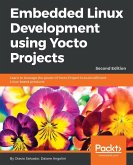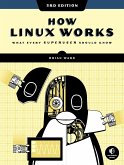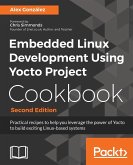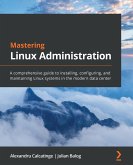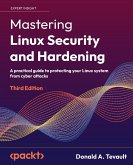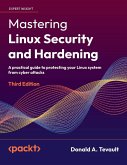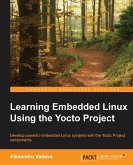Elevate your Linux-powered system with Yocto Projects, enhancing its stability and resilience efficiently and economically - now upgraded to the latest Yocto Project version Purchase of the print or Kindle book includes a free PDF eBook Key Features: - Optimize your Yocto Project tools to develop efficient Linux-based projects - Follow a practical approach to learning Linux development using Yocto Project - Employ the best practices for embedded Linux and Yocto Project development Book Description: The Yocto Project is the industry standard for developing dependable embedded Linux projects. It stands out from other frameworks by offering time-efficient development with enhanced reliability and robustness. With Embedded Linux Development Using Yocto Project, you'll acquire an understanding of Yocto Project tools, helping you perform different Linux-based tasks. You'll gain a deep understanding of Poky and BitBake, explore practical use cases for building a Linux subsystem project, employ Yocto Project tools available for embedded Linux, and uncover the secrets of SDK, recipe tool, and others. This new edition is aligned with the latest long-term support release of the aforementioned technologies and introduces two new chapters, covering optimal emulation in QEMU for faster product development and best practices. By the end of this book, you'll be well-equipped to generate and run an image for real hardware boards. You'll gain hands-on experience in building efficient Linux systems using the Yocto Project. What You Will Learn: - Understand the basic Poky workflows concepts along with configuring and preparing the Poky build environment - Learn with the help of up-to-date examples in the latest version of Yocto Project - Configure a build server and customize images using Toaster - Generate images and fit packages into created images using BitBake - Support the development process by setting up and using Package feeds - Debug Yocto Project by configuring Poky - Build an image for the BeagleBone Black, RaspberryPi 4, and Wandboard, and boot it from an SD card Who this book is for: If you are an embedded Linux developer and want to broaden your knowledge about the Yocto Project with examples of embedded development, then this book is for you. Professionals looking for new insights into working methodologies for Linux development will also find plenty of helpful information in this book. Table of Contents - Meeting the Yocto Project - Baking Our First Poky Based System - Using Toaster to Bake an Image - Meeting the BitBake tool - Grasping the BitBake Tool - Detailing the Temporary Build Directory - Assimilating Packaging Support - Diving into BitBake Metadata - Developing with the Yocto Project - Debugging with the Yocto Project - Exploring External Layers - Creating Custom Layers - Customizing Existing Recipes - Achieving GPL Compliance - Booting Our Custom Embedded Linux - Speeding Up Product Development Through Emulation - QEMU - Best Practices
Bitte wählen Sie Ihr Anliegen aus.
Rechnungen
Retourenschein anfordern
Bestellstatus
Storno



